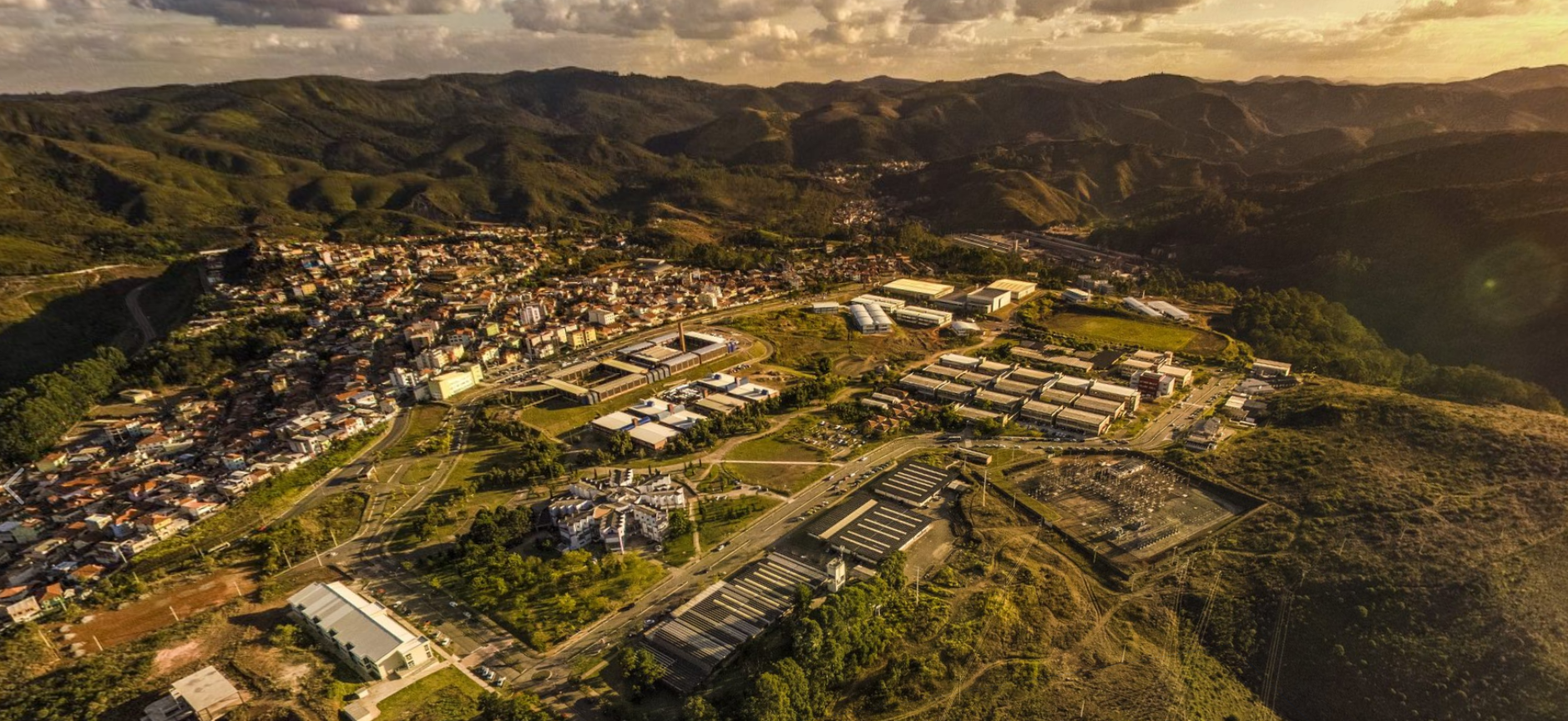History
The Federal University of Ouro Preto (Universidade Federal de Ouro Preto - UFOP) was founded on August 21, 1969 with the merger of two original higher education institutions, the School of Pharmacy and the School of Mines. Since its inception, UFOP has expanded, gaining new campi, programs, professors and collaborators.
The School of Pharmacy (EFAR) was created in 1839. It was originally situated in the former Provincial Assembly Headquarters, where the first Constitution of Minas Gerais was adopted. The School is the first state pharmaceutical college, and it is the oldest in Latin America. Currently, its administrative sector, collegiate and boards are located on the main campus (Morro do Cruzeiro) in Ouro Preto. The laboratories and classrooms work at both the school’s original historic headquarters and in the main campus.
In 1876, the scientist Henri Gorceix founded the School of Mines (EM), the first Brazilian institution dedicated to mining, metallurgy and geology education. Located in the former Governor’s Palace in the heart of Ouro Preto, it was transferred in 1995 to the Morro do Cruzeiro Campus.
Since 1970, the School of Physical Education (EEF), previously named University Sports Center (CEDUFOP), has developed activities along with several undergraduate programs. In 2008, the Physical Education Program was created with the Support Program of Restructuring and Expansion Plans for Federal Universities (REUNI).
In 1978 the Nutrition Program was created, and the School of Nutrition (ENUT) was founded in 1994 with its building set in the Morro do Cruzeiro Campus. In 1979, in the city of Mariana (approximately 9 km from Ouro Preto), the Institute of Humanities and Social Sciences (ICHS) was founded. Located in the former building of the Nossa Senhora da Boa Morte Seminary, the Mariana campus houses the History, Letters and Pedagogy Programs.
With the growing awareness and interest from the community in the area of Arts, the Institute of Philosophy, Arts and Culture (IFAC) was created in 1994, where the undergraduate programs in Dramatic Arts, Music and Philosophy are offered.
In 1982, in the Morro do Cruzeiro Campus, the Institute of Exact and Biological Sciences (ICEB) was created. It housed, initially, the basic undergraduate courses contained in the initial terms of the School of Mines, Pharmacy and Nutrition. Later on, it has grown to cover the undergraduate programs of Biological Sciences, Mathematics, Computer Sciences, Statistics, Physics, Chemistry and Industrial Chemistry as well. It also provides basic courses in the health area for the Medicine and Physical Education Programs.
In the 1990’s, two new programs began in UFOP. The first was the Law Program, founded in 1993, that has grown to become quite prestigious, winning a recommendation from the Brazilian Lawyers Order (OAB). A few years later, in 1999, the Tourism Program was created, which, besides reinforcing the University’s role in the region, promotes academic and applied approaches to tourism. The program aims towards integrated and sustainable development of the tourism market. Another expansion was the implementation of the Museology Program in 2008, the first of Minas Gerais. Its activities are also housed in the Morro do Cruzeiro Campus. In 2013, with the Law and Tourism Programs, it started to integrate a new academic unity with the name School of Law, Tourism and Museology (EDTM).
In 2000, the original Distance Education Center became the Center of Open and Distance Education (CEAD), which is currently part of the UAB - Universidade Aberta do Brasil (Brazilian Open University). Through CEAD, the University has been able to implement and offer undergraduate programs to over 30 cities in Minas Gerais, 13 in the state of São Paulo, and 8 in Bahia. During Presidents Lula and Dilma administrations, it was the largest undergraduate distance program in Brazil, with well over 5000 students successfully accomplishing their undergraduate degree studies in Public Administration, Geography, Pedagogy, and Mathematics through CEAD/UFOP. Many of those students have gone on to successfully complete masters and doctoral degrees in other higher education institutions in Brazil.
In 2002, the University inaugurated the João Monlevade advanced campus (approximately 132 km from Ouro Preto), offering programs in System Information and Production Engineering. In 2009, two new programs became part of the Institute of Exact and Applied Sciences (ICEA) in João Monlevade: Electrical Engineering and Computer Engineering.
At the beginning of 2013, the School of Medicine (EMED) was created in Morro do Cruzeiro Campus. The Medicine Program was previously founded in 2007, and it originally worked alongside the Pharmacy Department, but now has its own building.
By its membership to the REUNI, UFOP created one more academic unit in Mariana where four Programs are now housed: Administration, Economic Sciences, Journalism and Social Work, which have been working together since 2008 and integrate the Institute of Social and Applied Sciences (ICSA).
Currently, UFOP offers 51 undergraduate programs, among which there are 47 traditional on-campus Programs and 4 distance learning Programs. Regarding the graduate programs, UFOP offers 26 academic masters and 7 professional masters degrees, 16 doctoral degrees and 10 specializations (diplomas). In total, there are more than 11 thousand students, about 800 administrative staff members, and approximately 900 faculty members, among permanent and temporary ones.
UFOP seeks to bring the 21st century to a city that is over 300 years old, with projects related to preservation of the UNESCO heritage, the Cantaria (stone masonry) workshops that recover and restore the important monumental heritage, and the Art Forum, that promotes a reflection about Arts, Literature, Culture and Heritage. The Science and Technique Museum, the Pharmacy Museum, and the Astronomical Observatory are important conservation centers of memory and culture that keep a legacy of knowledge for the community.
Rectors
UFOP’s first Rector was Professor Antônio Pinheiro Filho. He took office on August 21, 1969 and held his position until September 1st, 1971. Below, the chronology of the University Rectors so far:
| Start | End | Rector |
|---|---|---|
| 08/21/1969 | 09/01/1971 | Prof. Antônio Pinheiro Filho |
| 09/01/1971 | 10/27/1971 | Prof. Orlando de Magalhães Carvalho |
| 10/27/1971 | 10/17/1975 | Eng. Geraldo Parreiras |
| 10/17/1975 | 01/31/1976 | Prof. José Campos Machado Alvim |
| 01/31/1976 | 06/29/1979 | Journalist Theódulo Pereira |
| 06/29/1979 | 07/15/1982 | Prof. Antônio Fagundes de Sousa |
| 07/15/1982 | 12/20/1984 | Prof. Maurício Lanski |
| 12/20/1984 | 12/20/1988 | Prof. Fernando Antônio Borges Campos |
| 12/20/1988 | 12/20/1992 | Prof. Cristóvam Paes de Oliveira |
| 12/20/1992 | 12/20/1996 | Prof. Renato Godinho Navarro |
| 12/20/1996 | 02/21/1997 | Prof. Antônio Lima Bandeira (pro-tempore) |
| 02/21/1997 | 02/15/2005 | Prof. Dirceu do Nascimento |
| 02/15/2005 | 02/22/2013 | Prof. João Luiz Martins |
| 02/22/2013 | 02/22/2017 | Prof. Marcone Jamilson Freitas Souza |
| 02/22/2017 | 02/22/2025 | Prof. Cláudia Aparecida Marliére de Lima |









